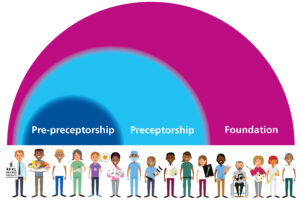The first sessions of a pioneering e-Compendium are now available to support preceptors across nursing, midwifery and the allied health professions (AHP).
The much-anticipated Multi-Professional Preceptor e-Compendium aims to recognise the needs of preceptors, and provides them with the guidance, support and practical tools needed to carry out their vital role. It marks the launch of a modern and cohesive set of resources that are aligned to the Preceptorship Principles and Frameworks across each of the professional groups.
The 2 sessions now available provide an overview of the preceptor role across each of the professional groups, along with dedicated training on leading and coaching preceptees. These sessions are currently free to access for health and care employees using their work email address to register. People without NHS or GOV email addresses will be able to access the e-Compendium in the future as the training develops, and we will share more information about this when available.
Moving into the role of a registered health and care professional is recognised to be a challenging time for staff. The e-Compendium forms part of the wider strategy to welcome and integrate newly registered professionals into the workplace, allowing them to successfully navigate the transitional period, and supporting their growth and confidence.
The training aims to help preceptors to reflect on their own experiences of this transitional period, and to optimise their knowledge and skills to best position themselves to support others. It also supports the preceptor to develop valuable skills that will help them in other supporting roles they may find themselves taking on during their current or future roles.
Developing the training has been a fantastic team effort across the nursing, midwifery and AHP workforce, and it is aligned and complementary to the Preceptorship Principles and Frameworks across these professional groups. Teams involved in creating the training include: NHS England WT&E’s National Nursing and Midwifery Team, National AHP Preceptorship and Foundation Support Programme, and National RePAIR Team, in partnership with the University of Huddersfield.
Accessing the training
To find out more and access the training, please visit the
Multi-professional Preceptor e-Compendium programme page.
Coming soon:
More sessions will be added to the e-Compendium in the near future, including: identifying and agreeing the Preceptee’s learning and support needs; the health and well-being of the preceptor and preceptee; reflecting on your experience as a Preceptor. More details on these will be shared as they become available.
Please also see:


 This supports AHP’s of all professions and working across all sectors to access high quality preceptorship and foundation support as they transition into and between roles or employment and progress through their careers.
This supports AHP’s of all professions and working across all sectors to access high quality preceptorship and foundation support as they transition into and between roles or employment and progress through their careers.